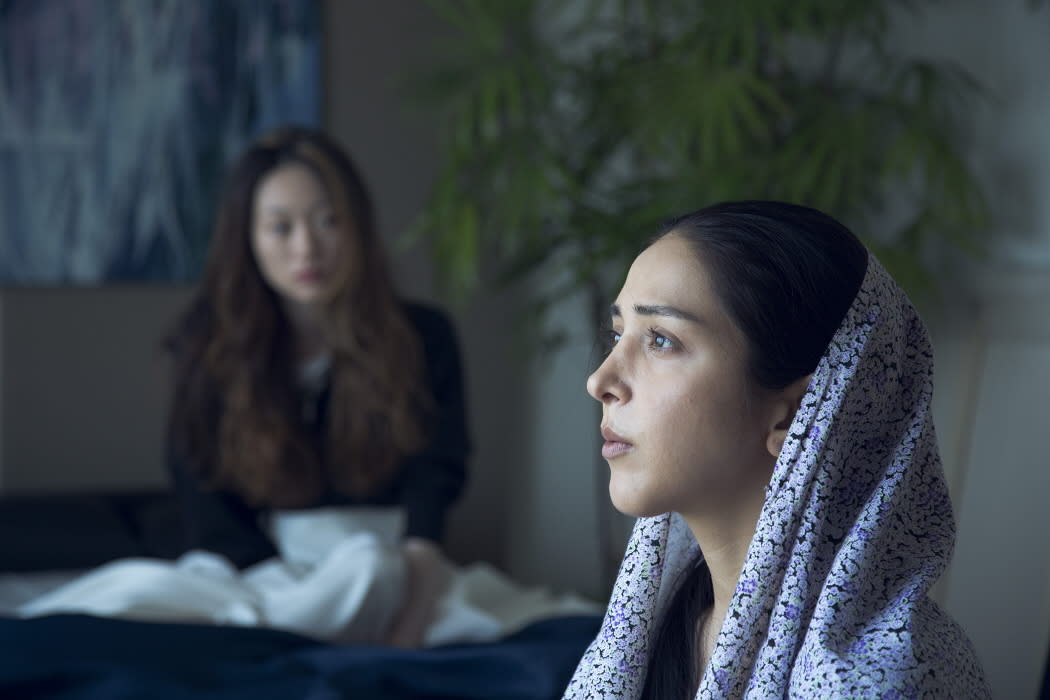Busan Film Review: ‘West North West’

Cultural, sexual and relational boundaries are delicately negotiated in “West North West,” a moody romantic melodrama about three young women fumbling their way toward an uncertain future. This sophomore feature effort from Japanese writer-director Takuro Nakamura (“Taito”) wraps its characters in a palpable veil of loneliness and isolation, aided by piercingly restrained performances from actresses Hanae Kan, Rosa Sahel and Yuka Yamauchi. Still, their emotionally intricate pas de trois would be better served by a tighter, more disciplined structure, absent the art-film longueurs and belabored narrative wrap-up that increasingly impede viewer involvement as the proceedings stretch to an overlong 125 minutes. Some trims in the closing stretch would improve commercial and festival prospects considerably, with Asian and LGBT-themed events an obvious but by no means exclusive destination.
Awash in dim blues and grays, d.p. Yasutaka Sekine’s muted visual palette casts alienating shadows from the outset as we first meet Naima (Sahel), a university student from Tehran who has come to Japan to study art. Although she’s fluent in the local language, Naima is shy, withdrawn and clearly having trouble fitting in, and an emotional distress call one evening draws the attention of another sad soul, Kei (Kan), who works behind the counter at a local cocktail bar. Kei’s own woes stem from her tempestuous relationship with her fashion-model girlfriend, Ai (Yamauchi), and she seeks solace — and perhaps something more — in the tentative friendship she strikes up with Naima.
The two women bond quickly but chastely, as Naima rides home on the back of Kei’s motorcycle and spends the night on her couch one evening. Nakamura’s script has a searching, ever-shifting sense of the various cultural prejudices and insecurities being confronted on both sides: Kei briefly scoffs at her houseguest’s five-prayers-a-day regimen (“What century is this?” she asks, to which Naima sharply replies, “Does it matter?”), but proves cautiously willing to try an authentic Iranian meal that Naima prepares for her, in one of the film’s sweetest and most naturalistic scenes. Tolerance and understanding, we realize, operate along many different lines: When Naima learns that Kei is dating another woman, her silent reaction betrays numerous conflicting impulses, her personal moral objections quietly doing battle with her essential decency and respect for her friend.
For her part, Kei isn’t comfortable identifying as a lesbian, and her resistance to being labeled as such finds a tidy parallel in the caged bird that Naima keeps for company, and which she steadfastly refuses to give a name. (Given that there are few metaphors in general more obvious than a caged bird, this is one subplot that could have safely landed on the cutting-room floor.) For all the difficulty Naima faces as the rare Iranian woman studying abroad in Japan (the pressures of her home and family life are hinted at here but never made explicit), Kei and Ai are presented as struggling with their own crisis of identity, albeit one that isn’t nearly as noticeable on the surface. And as passionately as they burn for one another, as we see in a few discreetly shot love scenes, the film makes clear that their sexuality remains fluid and indeterminate, as subject to societal pressures and expectations as it is to matters of personal desire.
It’s a measure of just how many subtle, unspoken levels of cultural difference the film is keeping in play that when Ai pushes Kei to break off her friendship with Naima — “She isn’t like us!” she snarls — it’s not entirely clear whether she’s referring to the other girl’s ethnicity or her sexual orientation (which, much like Naima’s hair, is kept mostly under wraps throughout). The remainder of the film slowly plays out every beat of this romantic triangle, as Kei and Naima cautiously try to figure out exactly what they mean to each other, while Ai seethes with jealousy and helplessness from the sidelines. As its title implies rather too emphatically, “West North West” is about the search for direction in life and the impossibility of knowing where you’re headed. Yet that ambiguity seems to feel increasingly like narrative indecision as the film progresses through a series of scenes that can seem by turn superfluous and hastily edited; it’s as though Nakamura (who also edited) seems unwilling to relinquish his hold on his characters, whom he treats with an admirable compassion at every step.
All three leads exert a quietly transfixing hold on the camera. Petite yet formidable, Yamauchi has the sort of laserlike glare that seem to burrow directly through the screen and into your skull, yet the film refuses to villainize her, showing how her anger stems from a readily identifiable place of desperation and insecurity. Though possessed of a similarly penetrating gaze, Kan hides an easily accessible core of warmth and approachability beneath Kei’s sullen surface, and Sahel plays Naima with soft-spoken grace; the two actresses achieve a rich emotional intimacy here that’s all the more poignant for going undefined.
The layers of sadness and confusion expressed in the performances are matched by the filmmaking, which favors lengthy closeups and a few instances of back-of-the-head-cam, and which continually defines the characters in opposition to a world that sometimes seems eerily underpopulated. While the action occasionally spills outdoors, it’s largely limited to a handful of key locations: Kei’s apartment, the community swimming pool where she seeks respite from the outside world, and the cocktail bar where she and Naima enjoy a few blissful moments on the dance floor — a rare moment when the soundtrack and visuals pulse to life in a movie that otherwise plays out in an aching minor key.
Related stories
Busan: Huace, NEW Unveil Joint Production Partnership
Busan: Policy Chiefs Propose Asian Film Promotion Body
Get more from Variety and Variety411: Follow us on Twitter, Facebook, Newsletter
